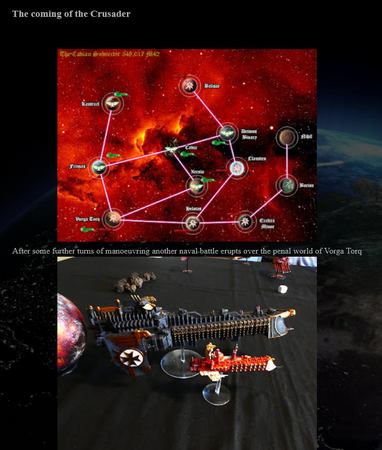
Demons of the Void
587 KB.
From the promo text:
"Never again attempt to develop this kind of technology."
It is with these words that an unknown alien attacker destroys the Earth cities of Tehran, Sydney and Beijing. Fifty million people die... and nothing is ever the same again.
Some call them Demons, some call them Aliens, but to Chinese Naval Captain Melissa Liao... they are the enemy. She is given command of one of three great warships built to fight the "demons", the TFR Beijing.
Her task is simple. Find who attacked Earth and why... then stop them.
There are about a thousand reasons why I shouldn't like this novel. To begin with, the title is all wrong for a sci-fi book. (Humans call the aliens "demons" because they hate them so much; the "Void" is space.) And why does the author throw in occasional sentences written in Chinese characters - does he expect that we'll understand them? More seriously, this is one of the most derivative pieces of fiction I've ever read - really, a few decades from now, people will still be quoting sci-fi shows from the 1960s? At times, the novel seems like a bizarre cross between Japanese manga and old-school sci-fi pulps.
And the two-dimensional characters! Melissa Liao is the heroine, a young naval officer who gets her command due to politics (plus the fact that all the other Chinese naval officers died in the initial alien attack - bad timing for that group meeting, guys... ![]() ). She's worried if she'll be able to live up to her command, she's worried about what her parents think of her... and she's worried if she'll ever get a boyfriend. Since she's "married" to her ship, it's a "he" - and for good luck, she makes her international crew speak English (?).
). She's worried if she'll be able to live up to her command, she's worried about what her parents think of her... and she's worried if she'll ever get a boyfriend. Since she's "married" to her ship, it's a "he" - and for good luck, she makes her international crew speak English (?).
Then there's her love interest, who happens to command another of Earth's three starships - James Gregoire, a generation older than Liao, and of African ancestry (we're told Liao likes black men...).
Then there's Australian scientist Summer Rowe, a one-dimensional character who seems to have stumbled out of a Japanese manga. Hot, geeky, sex-obsessed, red-haired, loud... annoying but brilliant.
With all these reasons not to like this novel, I was surprised to finish it all the way through. The writing style is easy to read, the chapters are like television episodes, and the suspense builds as the story moves from crisis to crisis.
The basic story is that when humans develop the beginnings of space-travel technology, mysterious aliens show up, destroy the three centers of technological development, tell humans to stop doing that, and leave.
So, naturally, the major nations unite and build the first three starships to fight back, using fortuitously developed technology - star drives, anti-grav, and advanced armor plating.
The story then weaves forward, from first encounter, to battles, to learning more about the aliens, while progressing in a dramatic fashion - ending with a suitably energetic conclusion, though a loose end is left to spark a sequel.
The version I've read was briefly a free download in Kindle format from Amazon, and is the first edition rather than the current "PG-13 version"-billed second edition. In the first edition, the book does have some vulgar language, the characters openly discuss sex, and Captain Liao's bedroom activities are mentioned from time to time in some detail.
As an American, I was put off by what I perceived as the author's politics. Now, it's fair game in a sci-fi novel to speculate about a future where the United States is a failed superpower. However, this novel veers into the political extreme when it credits America's fall to fighting "imaginary enemies" after 911, and the novel's characters seem to go out of their way with a few "anti-American" jibes. In contrast, this near-future novel casts Iran as one of the world's leading technological powers, closely allied with the European Union. Minor characters in the novel include several Iranians - and no Americans...
However, all faults aside, I actually enjoyed this novel. It's pulp sci-fi entertainment from start to finish, and wargamers should enjoy the starship battles.
Reviewed by ![]() Editor in Chief Bill
Editor in Chief Bill ![]()
![]() .
.









